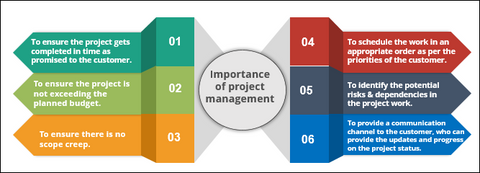What is Project Management and its Importance in ITIL ?
Project management
Project management is the art of managing the project and fulfilling its goals as per the defined time, scope, cost, and quality targets.

Note: Project is any temporary work with a defined starting time and end time with some defined outputs.
Project management has become an integral practice in any organization, irrespective of the industry (like banking, health care, chemical, manufacturing, hospitality, construction, etc.).
Project management can be broadly classified into 5 phases as initiation, planning, execution, monitoring, and closing.
Some of the prime processes that should be there in project management are scope management, risk management, cost management, procurement management, quality management, schedule management, communications management, etc.
Why do we need project management?
Project management practice is essential to follow a defined process in initiating, planning, executing, monitoring, and controlling the project activities which meet the customer requirements and commitments as promised by the service provider.
Below are some more detailed points elaborating the importance of project management:
- To ensure the project gets completed in time as promised to the customer.
- To ensure the project is not exceeding the planned budget.
- To ensure there is no scope creep.
- To schedule the work in an appropriate order as per the priorities of the customer.
- To identify the potential risks & dependencies in the project work.
- To provide a communication channel to the customer, who can provide the updates and progress on the project status.
Project Management Professional (PMP)

Project management professionals can be primarily classified into two categories as project manager and project management coordinator.
Project managers are accountable for delivering the project outcomes; this role will have to plan and organize schemes, resources, and people, ensuring that the project work is on time, scope, and budget. This role will have to track the work to be completed, set deadlines, and delegate tasks to the project team, identifying potential risks.
The project management coordinator/ officer works reporting to the project manager to assist and support specific teams on a project. The project Coordinator plans, organizes, and administers projects and coordinates the work assigned to associates on the project teams.
Responsibilities of Project Manager
- Plan, monitor the work and set deadlines to ensure the project is on time, cost, scope, and budget.
- Motivate project team, coordinate the work, identify and manage risks, and delegate tasks to the right human resources.
- Act as a liaison with all internal and external stakeholders and regularly report to management.
Responsibilities of Project Management Coordinator / Officer
- Executing administrative duties such as coordinating and scheduling meetings, preparing agendas, and documenting the meeting minutes.
- Managing and tracking detailed tasks, milestones, and risks in MS Project, Excel, and MS PowerPoint.
- Preparing and assisting the project manager in creating weekly and monthly status reports.
Project management in ITSM
Project management will play a vital role in IT Service Management because even ITSM’s focus is on achieving outcomes that are customer satisfaction concerning incident resolution and closure, service request fulfillment and closure, change implementation and closure, problem resolution and closure, etc. in defined timelines, cost, scope, and quality parameters.
As project management has five phases initiation, planning, execution, monitoring, and closure; in the same way, ITSM can be categorized into five: stages service strategy, service design, service transition, service operations, and continual service improvement.
We cannot map the five phases of project management to IT service management. Yet, the stages, processes, principles, and best practices of project management can be implemented in all the 26 processes and 4 functions of ITSM.
For example, implementing and operating incident management:
To implement incident management as a process and execute the operations, you would need an incident manager and incident analysts as human resources, who can follow the resource management process in project management. To maintain quality in incident management, the IT governance team can utilize project quality management practices from project management.
To maintain good communication with all the internal (problem manager, change manager, etc.) and external stakeholders (like customer team), the IT governance team can utilize and embed project communications and stakeholder management from project management.
Likewise, one can utilize other processes like risk management, integration management, cost management into the operation of ITSM.




